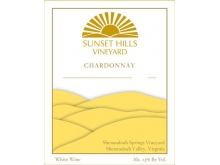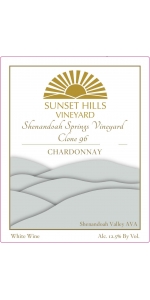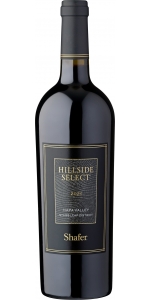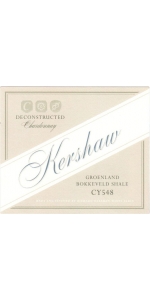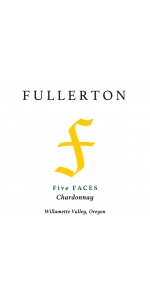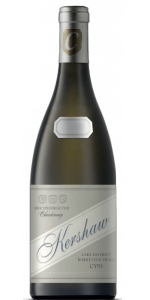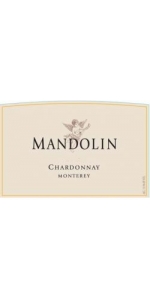Sunset Hills Chardonnay 2017
| Country: | United States |
| Region: | Virginia |
| Winery: | Sunset Hills |
| Grape Type: | Chardonnay |
| Vintage: | 2017 |
| Bottle Size: | 750 ml |
Sunset Hills Shenandoah Springs Chardonnay is made from 100 percent Chardonnay.
This is our first release of a clone-specific wine for Sunset Hills. The goal is to show you a specific terroir, one that year after year delivers excellent fruit quality. I chose clone 96 for its complexity both in ripening and barrel aging. During ripening, the fruit has notes of pineapple and pear with great acidity. I saw this wine as a chance to highlight not only the vineyard, but how detailed we can get in growing and making wine.
100% Chardonnay:
75% Clone 96
20% Clone 76
5% Clone 17
Notes of light honeysuckle, Asian pear, raw almond, and lemon custard. Medium body and medium acid.
The 2021 Shafer Hillside Select is crafted exclusively from grapes grown on Shafer's rugged hillside vineyards, where steep, rocky soils push the vines to produce low yields of intensely concentrated fruit. The unique terroir, combined with Napa Valley's hallmark climate of warm, sunny days and cool nights, contributed to a vintage with exceptional structure, lush tannins, and deep, vibrant color. The 2021 growing season exemplified these conditions, allowing the grapes to mature beautifully by early September, resulting in a wine with refined, pure aromas and flavors that reflect the richness and elegance of the vineyard.
“Such a beautifully balanced wine with tremendous staying power and expressive Stags Leap ironstone minerality with heady sagebrush and conifer notes with white pepper and walnut husk. The wine has an impressive depth of red-toned fruit on the mid-palate framed by tannins that practically dance across the palate, exuding length, tension, and power. Huckleberry and black cherry fruits, black truffle, dried violets, graphite, and salted dark chocolate are all framed by racy acidity, which keeps everything fresh and lifted. The 2021 releases mark Elias Fernandez's 38th vintage as Shafer's winemaker. He was hired by John Shafer in 1984, two weeks out of UC Davis.”
-Decanter, 99 Points
“The 2021 Cabernet Sauvignon Hillside Select was tasted as a barrel sample. Deep garnet-purple in color, it charges out with powerful notes of creme de cassis, plum preserves, and juicy blueberries giving way to an undercurrent of tar, candied violets, and star anise. The full-bodied palate is concentrated and impactful, delivering a firm, grainy texture and well-knit freshness to support the generous black and blue fruits, finishing long with loads of mineral and exotic spices sparks. This is impressive!”
-The Wine Independent, 98-100 Points
“As always, the 2021 Cabernet Sauvignon Hillside Select is 100% Cabernet Sauvignon that will spend 28 months in new barrels. Its deep purple hue gives way to a behemoth of a wine that has incredible cassis, black raspberry, and even blue fruits to go with loads of camphor, minty herbs, graphite, and darker chocolate. It's full-bodied, concentrated, yet pure, flawlessly balanced, and has a great finish.”
-Jeb Dunnuck, 97-99 Points
Kershaw Chardonnay Deconstructed Groenland Shale CY548 is made from 100 percent Chardonnay.
The inspiration for this Chardonnay stems from my belief that the Elgin region has both a signature grape as well as particular terroirs within its demarcated boundary that reflect regional credentials. This Chardonnay was selected from a sub-region of Elgin from a specific vineyard and an individual clone (CY548).
Tasting Notes:
Sourced from the foothills of the Groenland Mountain in Northern Elgin this clone has been taken from Corton Charlemagne cuttings. It produces wines that have aromatics oscillating between lemon blossom, white flowers, petrichor and struck stone. Full in body they exude concentration with white stone fruit yet reinforced with an austere texture and robustness that makes for excellent aging potential. The Bokkeveld Shales adds structure and concentration to the flavor.
Vineyards:
Sourced from the foothills of the Groenland Mountain in Northern Elgin this clone has been taken from Corton Charlemagne cuttings.
Winemaking:
Grapes were hand-picked in the early autumnal mornings, placed into small lug baskets and tipped directly into a press before being gently whole-bunch pressed up to a maximum of 0.6 bar or until a low juice recovery of 580 liters per ton was obtained. The juice gravity-flowed directly to barrel (no pumps were used at all) without settling. The unclarified juice had no enzymes or yeast added to it and therefore underwent spontaneous fermentation until dry, with malolactic discouraged. The wine rested in barrel for 4 months prior to judicious sulfuring and a further 7 months’ maturation in barrel before racking and bottling.
Barrel: Selection: A small number of artisanal coopers are selected from mostly Burgundy, with only French oak was chosen. Up to 40% of the oak is new with the remainder split into 2nd and 3rd fill barrels of predominantly 228 litres.
Look at pairing this with textured fish, straightforward chicken dishes, pan-fried or grilled pork dishes, soft-rind cheeses, cream or creamy dishes be it with pasta or the aforementioned fish, chicken or pork, to allow the complexity of the wine to shine through. If using mustard, preferably use Dijon mustard as it uses verjus (soured grape juice) and not vinegar. Also look to delicate herbs (tarragon, dill, basil, parsley) rather than hard stalked herbs (rosemary, thyme, oregano, etc). Avoid smoked meats or fish as well as highly spiced dishes as this can overwhelm the wine and clash with the oak. I would try oysters; Lobster grilled or boiled but not thermidor as it is too rich; turbot, dover sole, sea bass, yellowtail with a shellfish sauce; fish pie; roasted free-range chicken with tarragon; roast loin of pork with garlic and ginger; truffle risotto; pasta in a clam sauce; slice of brie de meaux.
Review:
"Perfume of flowers, minerals and citrus zest. The palate is dense and focused, almost chewy with an opulent mandarin mid palate and long, savory finish. Matured in 50% new oak that is seamlessly integrated with the wine."
- International Wine Review (Richard Kershaw Lifts Elgin To New Heights, February 2019), 94 pts
Fullerton Five Faces Chardonnay is made from 100 percent Chardonnay.
Five FACES is an acronym for the Fullerton family – Filip, Alex, Caroline, Eric, and Susanne. The wines blend fruit from multiple vineyards in Willamette Valley, mainly in the north of the valley with one to the west in the Van Duzer Corridor. A full representation of the Willamee Valley’s soil types is on display with one volcanic vineyard, two loess (windblown) vineyards, and two sedimentary vineyards. The vineyards range in elevation from 550-700 feet.
Honeydew melon, japanese pear, apricot, honeysuckle, apple-blossom, nutmeg, brioche, and lemon curd. Melon is echoed on the palate with notes of lemon, tangerine, toasted almonds, and fennel. Lovely and integrated acidity balances the palate weight from 17 months on the lees.
17 months in 10% new French Oak
Paris with creamy dishes and cheeses. Chicken and Turkey.
Kershaw Chardonnay Deconstructed Lake District Bokkeveld Shale CY95 is made from 100 percent Chardonnay.
The inspiration for this Chardonnay stems from my belief that the Elgin region has both a signature grape as well as particular terroirs within its demarcated boundary that reflect regional credentials. This Chardonnay was selected from a sub-region of Elgin from a specific vineyard and an individual clone.
Tasting Notes: Sourced from a parcel in the Western part of Elgin the 95 clone is known for its excellent quality creating wines that are aromatic, fuller bodied and rich yet tightly structured, well–balanced with length of flavor, managing to show restraint and mouth-watering passivity with a great line through the palate and fruit veering towards white peach flesh and nectarine. On Bokkeveld Shales it brings amplified perfume on the nose and persistence and elegance to the palate.
Winemaking:
Grapes were hand-picked in the early autumnal mornings, placed into small lug baskets and tipped directly into a press before being gently whole-bunch pressed up to a maximum of 0.6 bar or until a low juice recovery of 580 liters per ton was obtained. The juice gravity-flowed directly to barrel (no pumps were used at all) without settling. The unclarified juice had no enzymes or yeast added to it and therefore underwent spontaneous fermentation until dry, with malolactic discouraged. The wine rested in barrel for 4 months prior to judicious sulfuring and a further 7 months’ maturation in barrel before racking and bottling.
Review:
"Minerals and a hint of flint on the nose. The expressive minerality of this wine also shows on the palate with complementary light stone fruit notes. Aged in 50% new 228L oak aging for 11 months."
- International Wine Review (Richard Kershaw Lifts Elgin To New Heights, February 2019), 95 pts
With its maritime influence, California's Monterey region has an extended growing season that yields wines with full flavor development and great acid balance.
Mandolin Chardonnay has a lush tropical fruit core, balanced by crisp acidity and nicely integrated oak.
The grapes for this Chardonnay were sourced from vineyards in the Santa Lucia Highlands AVA of Monterey County, where high winds, dry days, and bay fogs create a cool, but very long, growing season. These growing conditions are ideal for cool-climate grapes such as Chardonnay, and lead to full, forward fruit flavors and ideal acidity. Grapes were harvested at an ideal balance of sugar and acid, and the wine was fermented in 1-2 year-old French oak barrels. This wine did not undergo malo-lactic fermentation, thus preserving its bright acidity. Total Acidity: 0.70 pH: 3.45 Residual Sugar: 0.51 g/liter
Notes of meyer lemon and white flower petals carry over to prange blossom and ripe melon.
The late heat in August and September really pushed the Chardonnay to develop into a fruit forward wine. Hand picked, chilled and pressed whole cluster. 10 -20 years old vines.
Sunset Hills Vineyard, nestled in the foothills of the Blue Ridge Mountains, produces award winning, 100% Virginia wines from our Amish restored, historic winery. From the planting of the first vines in 1999, Mike and Diane Canney, owners of Sunset Hills Vineyard, had a vision of making fine wine of the highest quality in a manner which was gentle on the land. That vision is reflected in the sustainable farming practices employed today.
The original Sunset Hills was a very large and beautiful farm that later became Reston Virginia. Diane and I used to work very long hours in office buildings in Reston, looking out over the scenic landscape, dreaming that one day we would have a beautiful farm like that. Years later, after searching to find the perfect place for our vineyards and winery, Diane and I bought our first farm. Each evening, we would watch the sun set over the Blue Ridge mountains, talking about what grapes to plant, where to plant them and how we would do whatever it took to maximize quality. In 1999, the first vineyard was planted and we needed a name. We knew it could only have the name of the farm we had admired years before. Today, many of our customers and friends enjoy our wines on the 150 yr old farm, and enjoy watching the sun set over mountains. Sunset Hills Vineyard has been the perfect name!
After graduating from UVA in 2011, it was Corry’s love of travel that first led her to the wine industry. She soon found herself working the harvest in far off places like New Zealand, Australia, South Africa, and France, with a few closer to home in Oregon and Virginia. She called both King Family and Blenheim Vineyards in Charlottesville home for a while, working harvests and spending time in the lab learning the ins and outs on winemaking, but it was her stretch in Oregon that showed her this wasn’t just a job, but a way of life. Although she’s been tempted by opportunities in Sonoma, CA, her desire to start her career as a winemaker in her home state of Virginia has kept her planted close to home. It excites her that Virginia is still in the early experimental phase of winemaking, and she really believes in the quality of wine that can be crafted here. She’s already experimenting in the cellar, and we can’t wait to see the fruits of her labor as they unfold in the future. If she’s not drinking a Virginia Chardonnay, you’ll most likely find her with a glass of Pinot Noir in her hand. When she’s not in the cellar, she’s likely out hiking, playing her cello or gone for a run.
Vineyard names:
Sunset Hills (18 acres), 50 West (7 acres), Shenandoah Springs (23 acres), Sherman Ridge (13 acres), Catesby (17 acres).
Age of the vines: 1 - 20 years
- back
EnRoute Winery Les Pommiers Pinot Noir is made from 100 percent Pinot Noir.
Aromas of fresh raspberry compote are complemented by notes of baking spice, and fresh rain on a forest floor. Generous-yet-soft strawberry preserve flavors expand on the palate, with elegant, silky tannins. A mouthwatering acidity glides across the finish.
Dark plum in color with abundant aromas of dark chocolate, black cherry, and sun-ripened blackberry with a hint of cedar. Layered flavors of blackberry and raspberry pie filling, accompanied by notes of cinnamon, chocolate, and nutmeg play on the palate. Smooth and focused with refined tannins and a medium finish.

